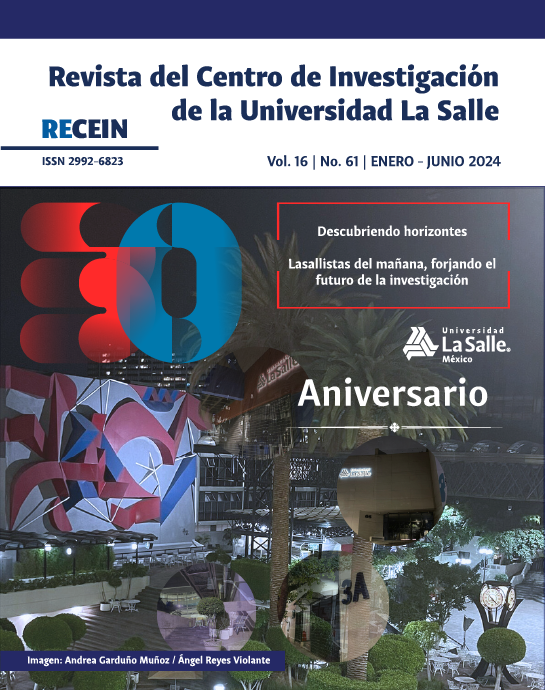Modelo conceptual de la participación de las Pymes mexicanas en el Capitalismo de Stakeholders en la era post-COVID19738
Contenido principal del artículo
Resumen
The crisis caused by COVID-19 was an event experienced globally and simultaneously, generating changes in the way people work, study, and carry out their social activities, giving the beginning of practical and theoretical conversations about the need to design and implement a new model of capitalism, oriented to the management of interest groups. The present work presents the theoretical and conceptual review related to the theoretical and conceptual constructs related to the contribution to the planet, people management, prosperity orientation, and governance factors that explain the participation of Mexican SMEs in interest group capitalism. Thus, it is shown that the process of adaptation to a "new normality" scenario will represent a factor of fundamental importance for social coexistence considering the risk represented by the effects caused by the new coronavirus, through the development of emerging strategies characterized by promoting the Adequate interaction between interested parties that constitute a model of capitalism that must equally weigh the social, economic, environmental and health dimensions for society in the long-term.
Descargas
Detalles del artículo

Esta obra está bajo una licencia internacional Creative Commons Atribución-NoComercial-CompartirIgual 4.0.
Esta revista se encuentra bajo la licencia de Creative Commons, por tanto, los autores, al postular su artículo, lo adhieren a dicha licencia.El autor puede disponer de su artículo para su archivo en repositorios institucionales o en páginas web personales, con la referencia y agradecimientos a la fuente donde se ha publicado.
Citas
Abrahamson, E., & Rosenkopf, L. (1993). Institutional and competitive bandwagons: Using mathematical modeling as a tool to explore innovation diffusion. Academy of management review, 18(3), 487-517. https://doi.org/10.5465/amr.1993.9309035148
Ashford, N. A., Hall, R. P., Arango-Quiroga, J., Metaxas, K. A., & Showalter, A. L. (2020). Addressing Inequality: The First Step Beyond COVID-19 and Towards Sustainability. Sustainability, 12(13), 5404. http://dx.doi.org/10.3390/su12135404
Berman, S., Wicks, A., Kotha, S. and Jones, T. (1999) Does Stakeholder Orientation Matter? The Relationship between Stakeholder Management Models and Firm Financial Performance. Academy of Management Journal, 42, 488-506. http://dx.doi.org/10.2307/256972
BID (2020). El impacto del Covid-19 en las economías de la región: Centroamérica, Haití, México, Panamá, y República Dominicana. http://dx.doi.org/10.18235/0002279
Buhalis, D. (2000). Marketing the competitive destination of the future. Tourism Management, 21(1), 97–116. https://doi.org/10.1016/S0261-5177(99)00095-3
Burgstahler, D. and Dichevm, I. (1997). Earnings Management to Avoid Earnings Decreases and Losses. Journal of Accounting & Economics, 24(1), 99–126. https://doi.org/10.1016/S0165-4101(97)00017-7
Caduff, C. (2020). What Went Wrong: Corona and the World after the Full Stop. Medical Anthropology Quarterly, 34(4), pp. 467–487. https://doi.org/10.1111/maq.12599
Carroll, A. B. (1991). The Pyramid of Corporate Social Responsibility: Toward the Moral Management of Organizational Stakeholders. Business Horizons, 34(4), 39–48.
Citlalli López-Torres, G. et al. (2016). Colaboración y actividades de innovación en Pymes. Contaduría y Administración, 61(3). 568–581. https://doi.org/10.1016/j.cya.2015.05.016
Cortés-Meda, A. and Ponciano-Rodríguez, G. (2021). Impacto de los determinantes sociales de la COVID-19 en México. Boletín sobre COVID-19, 2(17), pp. 9–13.
Coulter, S. (2020). All in it Together? The Unlikely Rebirth of Covid Corporatism. Political Quarterly, 91(3), pp. 534–541. https://doi.org/10.1111/1467-923X.12908
DOF (29 de mayo de 2020). Acuerdo por el que se establecen los Lineamientos Técnicos Específicos para la Reapertura de las Actividades Económicas. Secretaría de Gobernación. https://www.dof.gob.mx/nota_detalle.php?codigo=5594138&fecha=29/05/2020#gsc.tab=0
Economic Commission for Latin America and the Caribbean (2021). Building forward better Action to strengthen the 2030 Agenda for Sustainable Development. United Nations. https://hdl.handle.net/11362/46696
Estrada Bárcenas, R., García Pérez de Lema, D., & Sánchez Trejo, V. G. (2009). Factores determinantes del éxito competitivo en la Pyme: Estudio Empírico en México. Revista Venezolana de Gerencia, 14(46), 169-182.
FAO (2021). Trade facilitation policies and measures in Latin America and the Caribbean in response to COVID-19. https://www.fao.org/3/cb2830en/CB2830EN.pdf
FAO and ECLAC (2020). Food systems and COVID-19 in Latin America and the Caribbean: Trade performance during the crisis. Bulletin 12. FAO/CEPAL. https://hdl.handle.net/11362/45925
Freeman, R. E., Martin, K., & Parmar, B. (2007). Stakeholder capitalism. Journal of business ethics, 74, 303-314. https://doi.org/10.1007/s10551-007-9517-y
Fuchs, C. (2020). Everyday life and everyday communication in coronavirus capitalism. TripleC, 18(1), pp. 375–399. https://doi.org/10.31269/triplec.v18i1.1167
Fuentes, N., Osorio, G and Mungaray, A. (2016). Capacidades intangibles para la competitividad microempresarial en México. Problemas del Desarrollo. Revista Latinoamericana de Economía, 47(186), 83–106. http://www.redalyc.org/articulo.oa?id=11846179005
Goswami, S., & Bhaduri, G. (2023). Communicating Moral Responsibility: Stakeholder Capitalism, Types, and Perceptions. Sustainability, 15(5), 4386. https://doi.org/10.3390/su15054386
Grove, H., Clouse, M. and Xu, T. (2020). Stakeholder capitalism strategies and opportunities for corporate governance. Journal of Governance and Regulation, 9(4), pp. 59–68. https://doi.org/10.22495/jgrv9i4art5
Hillman, A. and Keim, G. (2001). Shareholder value, Stakeholder and social issues: What’s the bottom line? Strategic Management Journal, 22(2), 125–139. https://www.jstor.org/stable/3094310
Hühn, M. P. (2023). Business ethics: Between Friedman and Freeman? A response to A Puzzle about Business Ethics. Business Ethics, the Environment & Responsibility, 32(2), 868-876. https://doi.org/10.1111/beer.12523
ILO (2020). ILO’ s response to the impact of the COVID-19 pandemic on workers and enterprises. ILO.
Instituto Nacional de Estadística y Geografía (2019). Encuesta nacional sobre Productividad y Competitividad de las Micro, Pequeñas y Medianas Empresas (ENAPROCE) 2018. INEGI. https://www.inegi.org.mx/programas/enaproce/2018/
International Monetary Fund (2021), World Economic Outlook: Recovery during a Pandemic—Health Concerns, Supply Disruptions, Price Pressures. IMF.
Jones‐Khosla, L. A., & Gomes, J. F. S. (2023). Purpose: From theory to practice. Global Business and Organizational Excellence, 43(1), 90-103. https://doi.org/10.1002/joe.22203
Katz, R., Jung, J., & Callorda, F. (2020), “Can digitization mitigate the economic damage of a pandemic? Evidence from SARS”. Telecommunications Policy, 44(10), 102044. https://doi.org/10.1016/j.telpol.2020.102044
Katz, R., Jung, J., & Callorda, F. (2020). El estado de la digitalización de América Latina frente a la pandemia del COVID-19. CAF Banco de Desarrollo de América Latina.
Krueger, N. F., Reilly, M. D., & Carsrud, A. L. (2000). Entrepreneurial intentions: A competing models approach. Journal of Business Venturing, 15(5/6), 411-432.
Leach, M., MacGregor, H., Scoones, I., & Wilkinson, A. (2021). Post-pandemic transformations: How and why COVID-19 requires us to rethink development. World development, 138, 105233. https://doi.org/10.1016/j.worlddev.2020.105233
Leal Filho, W., Brandli, L. L., Lange Salvia, A., Rayman-Bacchus, L., & Platje, J. (2020). COVID-19 and the UN Sustainable Development Goals: Threat to Solidarity or an Opportunity? Sustainability, 12(13), 5343. http://dx.doi.org/10.3390/su12135343
Lucchese, M. and Pianta, M. (2020). The Coming Coronavirus Crisis: What Can We Learn? Intereconomics, 55(2), 98–104. https://doi.org/10.1007/s10272-020-0878-0
Mhlanga, D. and Moloi, T. (2020). The stakeholder theory in the fourth industrial revolution. International Journal of Economics and Finance Studies, 12(2), 352–368.
Mitchell, R. K., Agle, B. R. and Wood, D. J. (1997). Toward a Theory of Stakeholder Identification and Salience: Defining the Principle of Who and What Really Counts. Academy of Management Review, 22(4), 853–886. https://doi.org/10.5465/AMR.1997.9711022105
Monetary Authority of Singapore (2021). The international economy. Macroeconomic Review, 20(4), 9.
O’Brien, J. (2020). The moral foundations of stakeholder capitalism. Law and Financial Markets Review, 14(1), 1–4. https://doi.org/10.1080/17521440.2020.1724373
OECD and Eurostat (2018). Oslo Manual 2018: Guidelines for Collecting, Reporting and Using Data on Innovation (4th. Ed.). OECD Publishing. https://doi.org/10.1787/9789264304604-en
Oldekop J.A., Horner, R., Hulme, D., Adhikari, R., Agarwal, B., Alford, M., Bakewell, O., Banks, N., Barrientos, S., Bastia, T., Bebbington, A.J., Das, U., Dimova, R., Duncombe, R., Enns, C., Fielding, D., Foster, C., Foster, T., Frederiksen, T., Gao, P., Gillespie, T., Heeks, R., Hickey, S., Hess, M., Jepson, N., Karamchedu, A., Kothari, U., Krishnan, A., Lavers, T., Mamman, A., Mitlin, D., Monazam Tabrizi, N., Müller, T.R., Nadvi, K., Pasquali, G., Pritchard, R., Pruce, K., Rees, C., Renken, J., Savoia, A., Schindler, S., Surmeier, A., Tampubolon, G., Tyce, M., Unnikrishnan, V., Zhang, Y.F. (2020). COVID-19 and the case for global development. World Development, 134, 105044. https://doi.org/10.1016/j.worlddev.2020.105044
Orlitzky, M., Schmidt, F. L. and Rynes, S. L. (2003). Corporate social and financial performance: A meta-analysis. Organization Studies, 24(3), 403–441. https://doi.org/10.1177/0170840603024003910
Owen, J. R., & Kemp, D. (2023). A return to responsibility: A critique of the single actor strategic model of CSR. Journal of Environmental Management, 341, 118024. https://doi.org/10.1016/j.jenvman.2023.118024
R Core Team (2020). R: A language and environment for statistical computing. R Foundation for Statistical Computing. https://www.R-project.org/
SELA (2015). Políticas Públicas de apoyo a las MIPYMES en América Latina y el Caribe.
Spash, C. L. (2020) “The economy” as if people mattered: revisiting critiques of economic growth in a time of crisis. Globalizations, 18(7), 1087-1104. https://doi.org/10.1080/14747731.2020.1761612
SRE and Instituto Matías Romero (2021). The global health regime and the international response to Covid-19. https://www.gob.mx/cms/uploads/attachment/file/609142/NA10-Covid19-2021-ing-web.pdf
United Nations (2020) The Future We Want, the United Nations We Need. https://doi.org/10.18356/29593d5c-en
Viñán Andino, B. A. and Juárez Cerrillo, S. F. (2018). Modelos de Ecuaciones Estructurales con Mínimos Cuadrados Parciales. Benemérita Universidad Autónoma de Puebla.
Wallentin, G., Kaziyeva, D., & Reibersdorfer-Adelsberger, E. (2020). COVID-19 intervention scenarios for a long-term disease management. International Journal of Health Policy and Management, 9(12), 508-516. https://doi.org/10.34172%2Fijhpm.2020.130
Wilkinson, M. D., Dumontier, M., Aalbersberg, I. J., Appleton, G., Axton, M., Baak, A., Blomberg, N., Boiten, J.-W., da Silva Santos, L. B., Bourne, P. E., Bouwman, J., Brookes, A. J., Clark, T., Crosas, M., Dillo, I., Dumon, O., Edmunds, S., Evelo, C.T., Finkers, R., …, & Mons, B. (2016). The FAIR Guiding Principles for scientific data management and stewardship. Scientific data, 6(1), 6. https://doi.org/10.1038/sdata.2016.18
Williams, C. C. and Kayaoglu, A. (2020). COVID-19 and undeclared work: impacts and policy responses in Europe. Service Industries Journal, 40(13–14), 914–931. https://doi.org/10.1080/02642069.2020.1757073
Windsor, D. (2009). The Value Creation Proposition Suggests Two Requirements for Assessing Alternative Theories of Capitalism. Philosophy of Management, 8(3), 65–74. https://doi.org/10.5840/pom2009837
World Bank. (2020). Introduction: Global Goals, Shared Challenges.
World Economic Forum (2021). The Global Risks Report 2021: 16th Edition. WEF. http://www3.weforum.org/docs/WEF_The_Global_Risks_Report_2021.pdf
World Economic Forum (2020). Toward Common Metrics and Consistent Reporting of Sustainable Value Creation. World Economic Forum. http://www3.weforum.org/docs/WEF_IBC_ESG_Metrics_Discussion_Paper.pdf
 English
English


